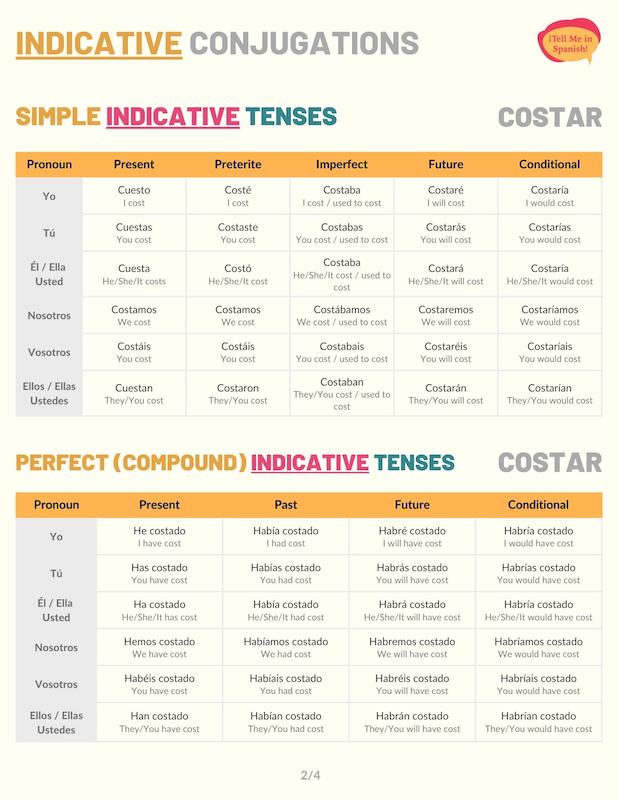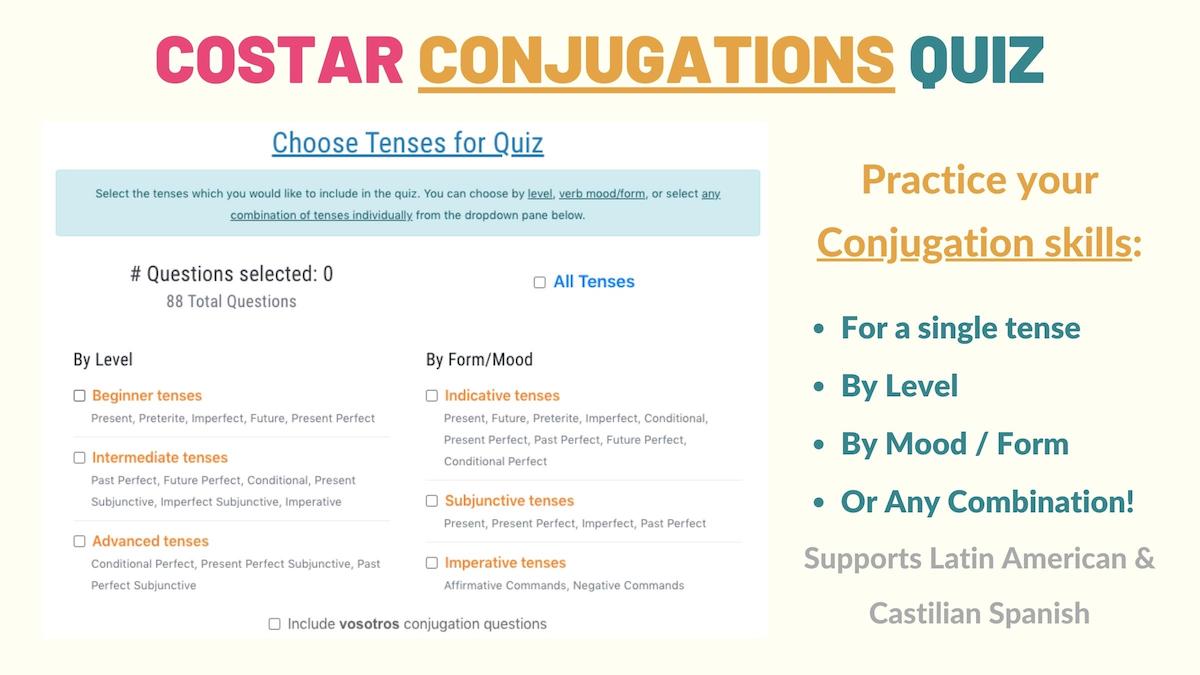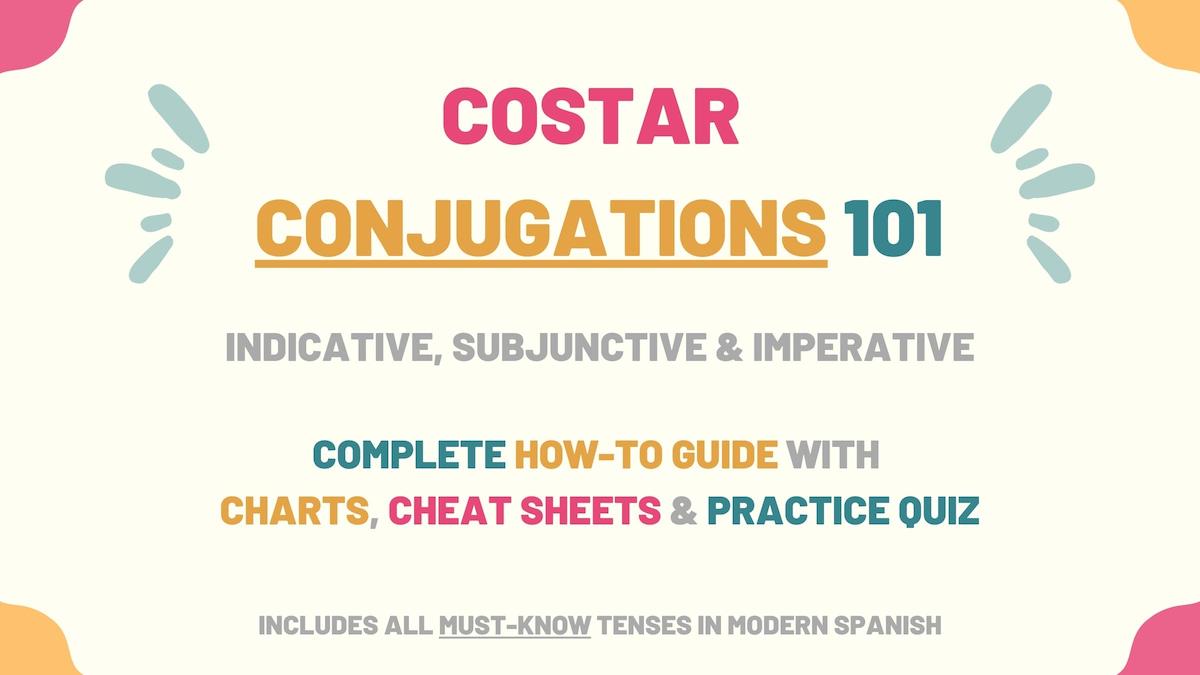Costar conjugation can help you practice the -AR verb conjugation pattern and O to UE stem changes. Seeing how necessary this verb is for daily conversations, in this guide, we’ll go over costar conjugation charts. Here is an overview of what we’ll cover:
- Costar Overview
- Indicative Tenses of Costar Conjugations
- Subjunctive Tenses of Costar Conjugations
- Imperative (Commands) of Costar Conjugations
- Uses & Examples
- Download Costar Conjugation Tables & Uses Cheat sheets
- Costar Conjugation Practice Quiz
Overview of Costar
| Verb Characteristic | Property |
|---|---|
| Verb Type | -AR |
| Irregular | No |
| Infinitive | Costar |
| Gerund (Present Participle) Form | Costando |
| Past Participle Form | Costado |
| Synonyms | Valer, ser difícil. |
Stem Changes: E to IE
- Present indicative: cuest for all subject pronouns except ‘nosotros’ and ‘vosotros’.
- Present subjunctive: cuest for all subject pronouns except ‘nosotros’ and ‘vosotros’.
The verb costar means ‘to cost’, ‘to find hard’, or ‘to struggle to do’. I have only used one translation in the conjugation charts below to keep the tables as organized and free of repetition as possible. You can learn more about the meanings of ‘costar’ in the section Uses & Meanings.
Indicative Conjugations of Costar
Present tense
Costar conjugation in the present tense has an O to UE stem change for all subjects except ‘nosotros’ and ‘vosotros’. We use the present forms of costar to refer to the current cost of things or to explain that someone struggles to do something.
For instance: Las galletas cuestan muy caras.
| Person | Conjugation | Translation |
|---|---|---|
| Yo | Cuesto | I cost |
| Tú | Cuestas | You cost |
| Él / Ella Usted | Cuesta | He/She costs You (formal) cost |
| Nosotros | Costamos | We cost |
| Vosotros | Costáis | You cost |
| Ellos / Ellas Ustedes | Cuestan | They cost You (plural) cost |
Preterite tense
We conjugate costar to the Spanish preterite tense to communicate the cost of things at a specific moment in the past. For example: El celular me costó $200 dólares.
| Person | Conjugation | Translation |
|---|---|---|
| Yo | Costé | I cost |
| Tú | Costaste | You cost |
| Él / Ella Usted | Costó | He/She cost You (formal) cost |
| Nosotros | Costamos | We cost |
| Vosotros | Costasteis | You cost |
| Ellos / Ellas Ustedes | Costaron | They cost You (plural) cost |
Imperfect tense
Costar imperfect tense forms refer to how much things used to cost. You can also use these conjugations to talk about the things someone used to find difficult to do. For example: En ese tiempo, las televisiones costaban mucho dinero.
| Person | Conjugation | Translation |
|---|---|---|
| Yo | Costaba | I cost I used to cost |
| Tú | Costabas | You cost You used to cost |
| Él / Ella Usted | Costaba | He/She cost He/She used to cost You (formal) cost You (formal) used to cost |
| Nosotros | Costábamos | We cost We used to cost |
| Vosotros | Costabais | You cost You used to cost |
| Ellos / Ellas Ustedes | Costaban | They cost They used to cost You (plural) cost You (plural) used to cost |
Near future
The Spanish near future tense is formed with ir (present tense) + a + infinitive verb (in this case, ‘costar’). We use these costar conjugations to communicate how much something is going to cost. Los boletos nos van a costar $500 dólares.
| Person | Conjugation | Translation |
|---|---|---|
| Yo | Voy a costar | I’m going to cost |
| Tú | Vas a costar | You’re going to cost |
| Él / Ella Usted | Va a costar | He/She is going to cost You (formal) are going to cost |
| Nosotros | Vamos a costar | We’re going to cost |
| Vosotros | Vais a costar | You’re going to cost |
| Ellos / Ellas Ustedes | Van a costar | They’re going to cost You (plural) are going to cost |
Future simple tense
Conjugate costar to the future simple tense to explain how much things will cost or what activities someone will find hard to do at some point in the future. Creo que el subjuntivo les costará un poco de trabajo.
| Person | Conjugation | Translation |
|---|---|---|
| Yo | Costaré | I will cost |
| Tú | Costarás | You will cost |
| Él / Ella Usted | Costará | He/She will cost You (formal) will cost |
| Nosotros | Costaremos | We will cost |
| Vosotros | Costaréis | You (formal) will cost |
| Ellos / Ellas Ustedes | Costarán | They will cost You (plural) will cost |
Conditional tense
When conjugated to the Spanish conditional perfect tense, costar communicates the cost of something if a past action had been completed. Additionally, you can use these forms to make hypotheses about the cost of things.
For instance: Si estudiaras más, las matemáticas no te costarían tanto.
| Person | Conjugation | Translation |
|---|---|---|
| Yo | Costaría | I would cost |
| Tú | Costarías | You would cost |
| Él / Ella Usted | Costaría | He/She would cost You (formal) would cost |
| Nosotros | Costaríamos | We would cost |
| Vosotros | Costaríais | You would cost |
| Ellos / Ellas Ustedes | Costarían | They would cost You (plural) would cost |
Present perfect tense
Use this verb conjugated to the Spanish present perfect to talk about how much things have or haven’t cost. Haber in the present tense + costado (past participle) is the structure to form the present perfect costar conjugation. Here is an example: Su educación nos ha costado mucho dinero.
| Person | Conjugation | Translation |
|---|---|---|
| Yo | He costado | I have cost |
| Tú | Has costado | You have cost |
| Él / Ella Usted | Ha costado | He/She has cost You (formal) have cost |
| Nosotros | Hemos costado | We have cost |
| Vosotros | Habéis costado | You have cost |
| Ellos / Ellas Ustedes | Han costado | They have cost You (plural) have cost |
Past perfect
Use costar in the Spanish past perfect tense to talk about how much something had cost before another past action or past time frame. For example: Pensé que este carro te había costado menos. Use the imperfect form of ‘haber’ and the past participle form of ‘costar’ to form this tense.
| Person | Conjugation | Translation |
|---|---|---|
| Yo | Había costado | I had cost |
| Tú | Habías costado | You had cost |
| Él / Ella Usted | Había costado | He/She had cost You (formal) had cost |
| Nosotros | Habíamos costado | We had cost |
| Vosotros | Habíais costado | You had cost |
| Ellos / Ellas Ustedes | Habían costado | They had cost You (plural) had cost |
Future perfect
In the future perfect tense, costar communicates how much things will have cost by or before a certain moment in the future. You can also use these forms to explain how much something might have cost. Estas televisiones les habrán costado mucho dinero.
| Person | Conjugation | Translation |
|---|---|---|
| Yo | Habré costado | I will have cost |
| Tú | Habrás costado | You will have cost |
| Él / Ella Usted | Habrá costado | He/She will have cost You (formal) will have cost |
| Nosotros | Habremos costado | We will have cost |
| Vosotros | Habréis costado | You will have cost |
| Ellos / Ellas Ustedes | Habrán costado | They will have cost You (plural) will have cost |
Conditional perfect
When conjugated to the Spanish conditional perfect tense, costar communicates what the cost of something would have been if a past action had been completed. You can also use this tense to hypothesize about how much something cost in the past.
For example: Si hubieran puesto atención, los verbos no les habrían costado tanto trabajo.
| Person | Conjugation | Translation |
|---|---|---|
| Yo | Habría costado | I would have cost |
| Tú | Habrías costado | You would have cost |
| Él / Ella Usted | Habría costado | He/She would have cost You (formal) would have cost |
| Nosotros | Habríamos costado | We would have cost |
| Vosotros | Habríais costado | You would have cost |
| Ellos / Ellas Ustedes | Habrían costado | They would have cost You (plural) would have cost |
Progressive tenses
The conjugations of costar in the progressive tenses are used to explain that someone is struggling to do something at the moment of speaking. For example: Este proyecto nos está costando mucho trabajo. The progressive tenses are formed with estar + costando (present participle).
| Progressive Tense | Formula | Translation Example |
|---|---|---|
| Present | Estar (present) + costando | I am costing |
| Preterite | Estar (preterite) + costando | You were costing |
| Imperfect | Estar (imperfect) + costando | He was costing |
| Future | Estar (future) + costando | We will be costing |
| Conditional | Estar (conditional) + costando | They would be costing |
Costar Subjunctive Conjugations
The subjunctive mood in Spanish is used to talk about wishes, requests, suggestions, expectations, doubts, or hypothetical situations. Below are the costar conjugation charts for the most common subjunctive tenses.
Present subjunctive
Costar present subjunctive conjugations have an O to UE stem change for all subjects except ‘nosotros’ and ‘vosotros’. In the present subjunctive, costar is used to express hopes, doubts, or desires about the current costs of things.
For instance: No creo que te cueste más de diez pesos.
| Person | Conjugation | Translation |
|---|---|---|
| Yo | Cueste | I cost |
| Tú | Cuestes | You cost |
| Él / Ella Usted | Cueste | He/She costs You (formal) cost |
| Nosotros | Costemos | We cost |
| Vosotros | Costéis | You cost |
| Ellos / Ellas Ustedes | Cuesten | They cost You (plural) cost |
Present perfect subjunctive
To conjugate the present perfect subjunctive of costar, you must use the formula haber in the present subjunctive + costado. Use these conjugations to wonder or wish that the cost someone paid for something was high or low. For example: Ojalá que las camisas les hayan costado baratas.
| Person | Conjugation | Translation |
|---|---|---|
| Yo | Haya costado | I have cost |
| Tú | Hayas costado | You have cost |
| Él / Ella Usted | Haya costado | He/She has cost You (formal) have cost |
| Nosotros | Hayamos costado | We have cost |
| Vosotros | Hayáis costado | You have cost |
| Ellos / Ellas Ustedes | Hayan costado | They have cost You (plural) have cost |
Imperfect subjunctive
The imperfect subjunctive conjugations of ‘costar’ are used to talk about past suggestions, requests, doubts, or wishes someone had about the cost of something. No creí que las camisas costaran tanto.
Depending on the type of Spanish you’re using, there are two ways to conjugate the imperfect subjunctive:
Latin American Spanish version
| Person | Conjugation | Translation |
|---|---|---|
| Yo | Costara | I cost |
| Tú | Costaras | You cost |
| Él / Ella Usted | Costara | He/She cost You (formal) cost |
| Nosotros | Costáramos | We cost |
| Ellos / Ellas Ustedes | Costaran | They cost You (plural) cost |
Note: Vostros is not used in Latin American Spanish. As a result, the previous table doesn’t include the conjugation for this pronoun.
Castilian Spanish version
| Person | Conjugation | Translation |
|---|---|---|
| Yo | Costase | I cost |
| Tú | Costases | You cost |
| Él / Ella Usted | Costase | He/She cost You (formal) cost |
| Nosotros | Costásemos | We cost |
| Vosotros | Costaseis | You cost |
| Ellos / Ellas Ustedes | Costasen | They cost You (plural) cost |
Past perfect subjunctive
In the past perfect subjunctive, costar is used to talk about how much something would have cost if a past circumstance was met. Additionally, these conjugations also express regret for the price something had cost.
For example: Si costaran más baratas, hubiéramos comprado esas flores.
| Person | Conjugation | Translation |
|---|---|---|
| Yo | Hubiera costado | I had cost |
| Tú | Hubieras costado | You had cost |
| Él / Ella Usted | Hubiera costado | He/She had cost You (formal) had cost |
| Nosotros | Hubiéramos costado | We had cost |
| Vosotros | Hubierais costado | You had cost |
| Ellos / Ellas Ustedes | Hubieran costado | They had cost You (plural) had cost |
Costar Imperative Conjugations
The Spanish imperative mood conjugations are used to give orders. Since you cannot command someone about the cost of something, we never use the imperative forms of costar.
Meanings of Costar & Examples
Now that you’ve learned how to conjugate costar, let’s check how to use and apply this verb correctly.
Costar is a verb like gustar. In other words, its conjugation is based on the thing or activity you’re paying for.
- Express the cost of things
Los patines costaban muy baratos.
The skates used to cost very little.
¿Cuánto cuesta un boleto a México?
How much is a ticket to Mexico?
Take Note: When talking about the price of things, we usually refer to activities or singular and plural objects. As a result, the third-person forms of costar are the conjugations we use the most.
- Talk about activities someone struggles to do
[Indirect object pronoun] + [costar conjugated] + (trabajo/adverb)
Los verbos como gustar me cuestan mucho trabajo.
I struggle with verbs like gustar.
Antes, cocinar nos costaba mucho.
Before, cooking was very difficult for us.
Download Costar Conjugation Tables & Uses Cheat sheets

You can download a copy of the free PDF cheat sheets which include all of the costar conjugation charts as well as its meanings and uses.
Practice Quiz: Costar Conjugation

Now that you know how to conjugate costar in Spanish, you can solidify your knowledge of this verb by taking the costar conjugation practice quiz.



